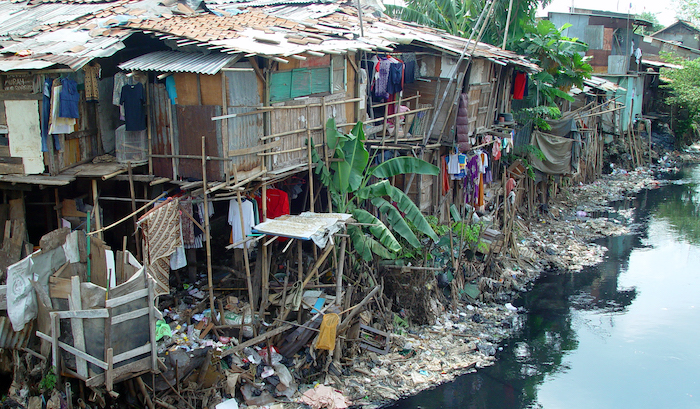Once a month here on the Molten Sulfur Blog, I run content taken from our book Archive: Historical People, Places, and Events for RPGs. This post is one of eighty entries in Archive, each more gameable than the last!
This post is brought to you by beloved Patreon backer Justin Moor. Thanks for helping keep the lights on! If you want to help keep this blog going alongside Justin, head over to the Patreon page – and thank you!

Jakarta Slums
The Hidden Reality
Jakarta, Indonesia is one of the world’s greatest megalopolises. Above gridlocked streets, luxurious high-rises stretch through veils of smog to claw at the sky. But lurking behind the fancy malls, hotels, and condominiums is the “real” Jakarta. Families live in half-makeshift shacks, treading pathways of rubble and garbage. Children play in the littered streets, and ride their little trikes around the tight corners of narrow alleys. They don’t live far from the glitz and glam, but their side of Jakarta is one visitors seldom see.
Jakarta is a city of surreal juxtaposition. The high-rises and clubs of the rich and famous are fringed with rickety slums. Here, a woman struts down the street in some designer’s latest outfit. A block away, a mother and child trudge through a flooded stone strip on their way home. Kids play in the front yards of alleys padded with trash, some of the children so young they still have pacifiers clipped to their shirts. But they don’t seem to mind their surroundings as much as the society girl might. These tight-knit alleys are their home, brimming with a community that has endured hardship for generations.
Though Jakarta is riven with streams, clean water is the biggest expense many slum residents face. In 2010, less than half of Jakarta’s population had access to piped water. Instead, they bathe and wash their clothes in the murky gray waters of fish ponds and other unsanitary sources. Slum residents have to spend the equivalent of up to $1 a day to buy clean water for drinking and cooking: half of the average daily wage. Though diseases and parasites plague some of the residents, many have grown accustomed to itchy skin and loose stools. The consequences of their situation are just a fact of life.
The government has little power in the slums. Most are really ruled by gangs. Interestingly, Jakarta’s gangs are rather peaceful. Though they absolutely do kill people and war with one another, levels of violence are nowhere near what is found in slums in Latin America. The government is generally able to keep the gangs nonviolent by working with them, rather than against them. The military, police, intelligence services, and political parties have relationships with the gangs going back decades. The gangs are part of the system. It’s a lucrative setup in corruption-riddled Jakarta. In addition to kickbacks and bribes, gangs collect money by running extortion, prostitution, gambling, and drug rings. They operate out of the slums, and may institute checkpoints and control entry to the neighborhoods they rule.
There have been efforts to put an end to slums in Jakarta, but some residents aren’t eager to leave, even if offered modern housing. The people living in the slums have livelihoods they enjoy and want to maintain. Moving them into housing can disturb that. Some of the people in the slums have run small convenience stores or single-table restaurants for two or three generations. They’ve made connections with clients and neighbors. It’s the only life many have ever known. Tearing down the slums doesn’t just destroy these people’s jobs. It destroys the entire social support network their lives depend on. When the government scatters your friends and family across town and drops you in a housing project full of strangers, who do you turn to to watch the kids? Or to lend a hand when times are hard? You have to rebuild your entire life, and do it without the help of the people you’ve always depended on. Small wonder that when slums are targeted for redevelopment, some residents don’t feel grateful. They’re more likely to move to another slum, or even form a new one, than be uprooted and plopped into a life they’ve never known.
Jakarta Slums in Play
At the table, the slums of Jakarta would be an interesting place to venture, especially if some or all of your PCs never knew such places existed behind the glamor. How would they react to seeing people bathing in gray water? Or seeing streets coated in heaps of trash? Different PCs might interact with the slums in different ways. Healers could ingratiate themselves with the locals by curing the diseases that come with unsanitary conditions. Wannabe warlords could find plenty of willing followers happy to take great risks for little pay. Rogue types might feel compelled to play Robin Hood in the wealthy parts of Jakarta. The gangs are a wild card. Depending on how much money is to be made, they might offer the party connections to the highest ranks of government. Or they might see the PCs as competition and try to run them out of town.

Enjoy this post? Consider sharing it on Facebook or Twitter to increase visibility for the Molten Sulfur Blog!






